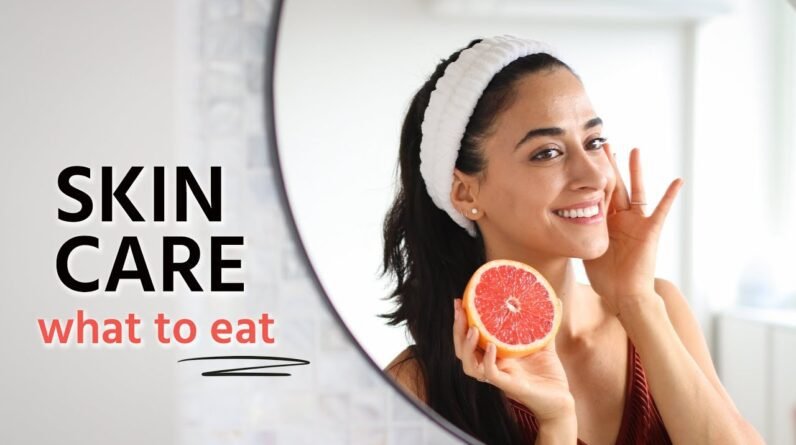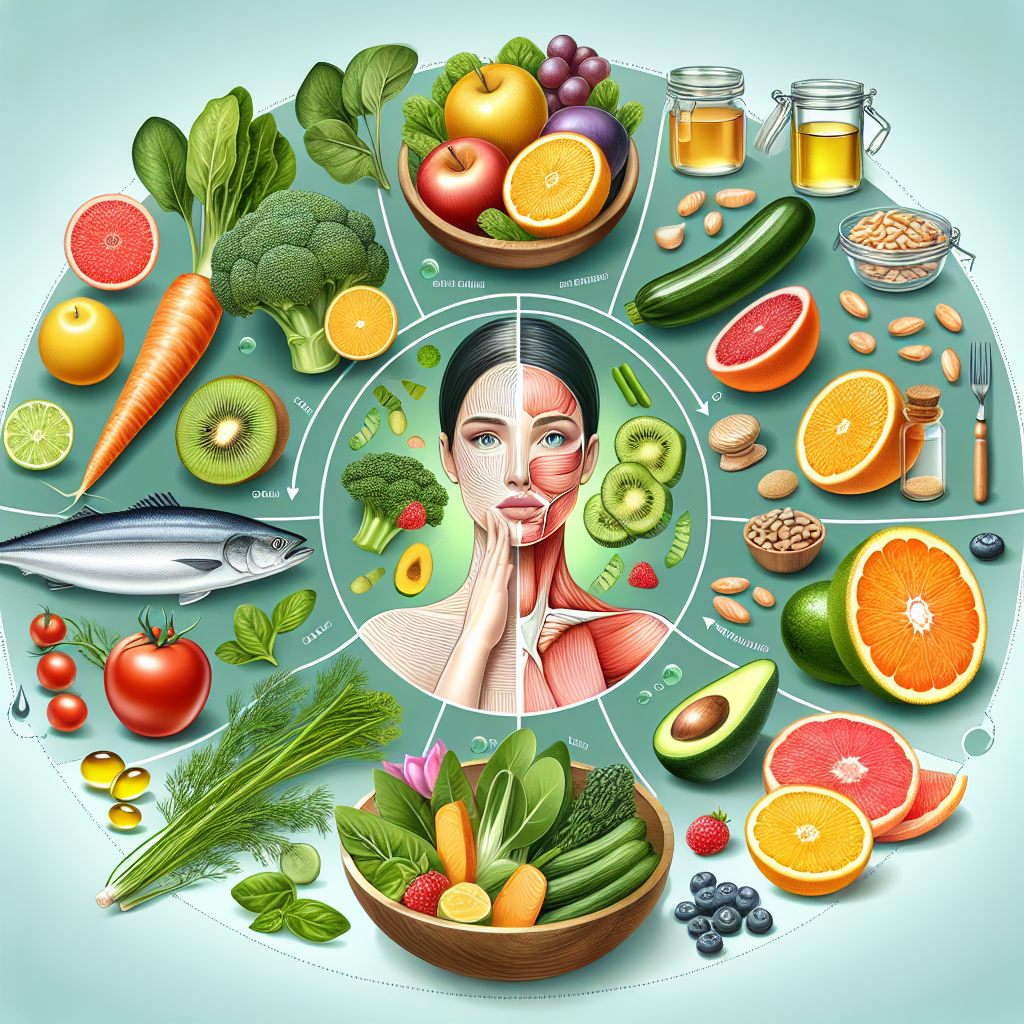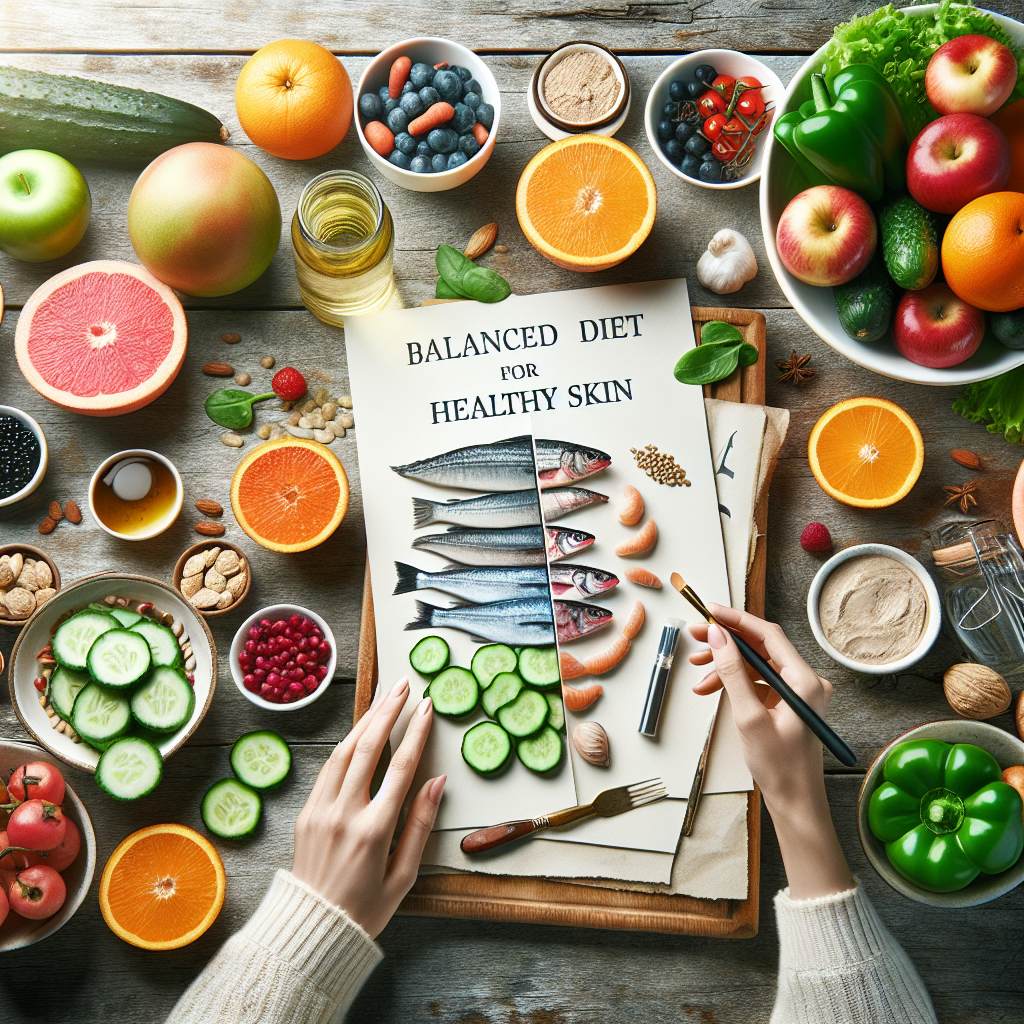
Hey there! Today, we’re delving into the world of nutrition and its impact on our skin health. In this article, we’ll explore various skin concerns such as collagen production, healing, dryness, sebum production, gut health, and inflammation, and how our food choices can support a healthy complexion. While it’s important to understand that there’s no “miracle” food or product for perfect skin, incorporating foods rich in protein, vitamins C and E, zinc, omega-3 fats, and low glycemic foods, along with probiotics and anti-inflammatory foods, can contribute to a healthier skin. Remember, individual results may vary depending on factors like hormones, stress, and medications. So, let’s dive into the article and discover how we can nourish our skin from the inside out!
The Link Between Nutrition and Skin Health
Our skin is not only affected by external factors such as skincare products and stress but also by internal factors like nutrition. The foods we eat play a significant role in maintaining healthy skin. In this article, we will explore the connection between nutrition and skin health and discuss how poor nutrition can impact the skin.
The Role of Nutrition in Maintaining Skin Health
Nutrition plays a crucial role in maintaining skin health. The food we consume provides essential nutrients that support the structure and function of our skin. These nutrients help in collagen production, wound healing, reducing inflammation, and improving overall skin health.
How Poor Nutrition Can Affect the Skin
When we have a poor diet lacking in essential nutrients, it can have a negative impact on our skin. Poor nutrition can lead to collagen breakdown, delayed wound healing, dryness, excessive sebum production, gut health issues, and increased skin inflammation. It is important to understand how our diet can contribute to these skin concerns and make necessary changes to support our skin health.
Skin Concerns and How Nutrition Can Help
Addressing Collagen and Healing
Collagen is a crucial protein for maintaining the firmness and elasticity of our skin. As we age, our body produces less collagen, leading to aging skin. However, by including protein-rich foods in our diet, such as beans, lentils, tofu, tempeh, nuts, and seeds, we can provide the body with the necessary building blocks to produce collagen. Additionally, foods rich in vitamin C (citrus fruits, bell peppers, broccoli) and vitamin E (almonds, sunflower seeds, avocados) help repair damaged collagen and stimulate its production.
Combatting Dryness and Sebum Production
Dry skin can be caused by various factors, including exposure to dry air and prolonged hot water exposure. To hydrate the skin from within, it is essential to include healthy fats in our diet. Omega-3 fats, found in walnuts, hemp seeds, chia seeds, and ground flax seeds, help improve the skin’s barrier function and retain moisture. On the other hand, excessive sebum production can contribute to acne and blackhead formation. High-glycemic foods, such as sugary beverages and refined grains, can trigger sebum production. Opting for low-glycemic foods like vegetables, whole grains, tofu, edamame, nuts, and seeds can help regulate sebum production.
Improving Gut Health for Better Skin
There is a strong connection between gut health and skin health. An imbalance in gut bacteria can contribute to skin conditions like acne, psoriasis, and eczema. To support a healthy gut, it is recommended to consume probiotic-rich foods such as plant-based yogurts, kimchi, miso, sauerkraut, and kombucha. These foods introduce beneficial bacteria into the gut, promoting overall gut health and improving skin conditions.
Reducing Skin Inflammation Through Diet
Inflammation is a common underlying factor in various skin problems, including acne, wrinkles, and rosacea. By incorporating anti-inflammatory foods into our diet, we can help reduce skin inflammation and promote healthy skin. Fruits and vegetables, rich in antioxidants, have been shown to have a positive impact on skin elasticity, smoothness, and color. Including a wide variety of colorful fruits and vegetables in our meals can provide us with the necessary antioxidants to combat inflammation and support skin health.
Key Nutrients for Skin Health
The Importance of Proteins
Proteins are essential for our skin’s health as they provide the building blocks for collagen production. Including protein-rich foods in our diet, such as legumes, tofu, tempeh, nuts, and seeds, ensures an adequate intake of proteins to support collagen synthesis and maintain firm and elastic skin.
How Vitamin C and E Benefit the Skin
Vitamin C and E play a crucial role in repairing damaged collagen and maintaining its strength. Foods rich in vitamin E, such as almonds, sunflower seeds, leafy greens, peanuts, and avocados, contribute to collagen repair. Vitamin C, found in citrus fruits, bell peppers, and broccoli, stimulates collagen production and helps maintain healthy skin.
The Role of Zinc in Skin Health
Zinc is essential for wound healing and has anti-inflammatory properties beneficial for managing skin conditions like acne, psoriasis, eczema, and rosacea. Foods rich in zinc include nutritional yeast, seeds (pumpkin, sesame, hemp), legumes (beans, lentils), tofu, and whole grains. Soaking beans, grains, nuts, and seeds before eating them can improve zinc absorption.
Omega-3 Fats and Their Effect on the Skin
Omega-3 fats are essential for maintaining skin hydration and improving the skin’s barrier function. Incorporating foods rich in omega-3 fats, such as walnuts, hemp seeds, chia seeds, and ground flax seeds, can help keep the skin moisturized and prevent dryness.
The Impact of Low Glycemic Foods on Skin Health
High-glycemic foods, which quickly raise blood sugar levels, can trigger excess sebum production and contribute to skin issues like acne. On the other hand, low-glycemic foods, found in vegetables, whole grains, tofu, edamame, nuts, and seeds, have a slower impact on blood sugar levels and can promote healthy skin by reducing sebum production.
Probiotics for Skin Health
How Probiotics Can Improve Skin Conditions
Probiotics, beneficial bacteria found in certain foods, can have a positive impact on skin health by improving gut health. A healthy gut microbiome can help reduce skin conditions like acne, psoriasis, and eczema. Including probiotic-rich foods such as plant-based yogurts, kimchi, miso, sauerkraut, and kombucha can support a healthy gut and improve skin conditions.
Foods Rich in Probiotics
Probiotic-rich foods are a great way to introduce beneficial bacteria into our gut. Plant-based yogurts, fermented vegetables like kimchi and sauerkraut, miso soup, and kombucha are excellent sources of probiotics that can contribute to better skin health.

Anti-Inflammatory Foods for Skin Health
The Role of Inflammation in Skin Problems
Inflammation is often associated with various skin problems like acne, wrinkles, and rosacea. By focusing on an anti-inflammatory diet, we can help reduce inflammation and improve our skin’s overall health.
Examples of Anti-Inflammatory Foods
Anti-inflammatory foods are rich in antioxidants and have been shown to benefit the skin. Fruits and vegetables, especially those with vibrant colors, are excellent sources of antioxidants. Including berries, leafy greens, tomatoes, and other colorful produce in our diet can help reduce inflammation and promote healthy skin.
Hydration and Skin Health
The Importance of Water for Skin Health
Proper hydration is essential for skin health. Water helps in maintaining the skin’s moisture balance, eliminating toxins, and promoting a healthy complexion. It is important to drink an adequate amount of water daily to support optimal skin hydration.
How Hydration Affects Skin Dryness and Elasticity
Dehydration can lead to dry and dull-looking skin. When the body is not properly hydrated, the skin loses its moisture, resulting in dryness and a lack of elasticity. By staying hydrated, we can improve skin dryness and maintain its youthful appearance.
How to Maintain Proper Hydration
To maintain proper hydration, it is recommended to drink at least 8 glasses of water per day. Additionally, consuming hydrating foods like fruits and vegetables, along with herbal teas and infused water, can contribute to overall hydration.

Dietary Tips for Clear and Glowing Skin
Creating a Balanced Diet for Skin Health
To achieve clear and glowing skin, it is important to create a balanced diet that includes a variety of nutrient-rich foods. This includes incorporating fruits, vegetables, whole grains, legumes, lean proteins, healthy fats, and limiting processed and sugary foods.
Incorporating Healthy Foods into Daily Diet
Incorporating healthy foods into our daily diet can have a significant impact on our skin health. Including protein-rich foods, colorful fruits and vegetables, whole grains, and healthy fats in our meals can provide the necessary nutrients for healthy and radiant skin.
Reducing Intake of Skin-Harming Foods
To improve skin health, it is advisable to reduce the consumption of skin-harming foods like high-glycemic foods, sugary beverages, processed foods, and foods high in saturated and trans fats. Opting for whole, unprocessed foods and mindful eating can benefit our skin.
The Role of Other Factors in Skin Health
How Stress Affects Skin Health
Stress can have a negative impact on our skin health. It can worsen existing skin conditions like acne, eczema, and psoriasis, and contribute to premature aging. Managing stress through relaxation techniques, exercise, and self-care practices can help improve skin health.
Effects of Medications on Skin Health
Certain medications can have side effects that affect the skin. Some medications may cause dryness, rashes, or acne. It is essential to be aware of the potential skin-related side effects of medications and consult a healthcare professional if any issues arise.
Understanding the Role of Hormones in Skin Conditions
Hormonal fluctuations can contribute to various skin conditions, such as acne, oily skin, and dryness. Understanding the impact of hormones on the skin can help us make informed decisions about our skincare and dietary choices to support hormonal balance.
The Importance of a Good Skincare Regimen
While nutrition plays a vital role in skin health, it is important to complement it with a good skincare regimen. Cleansing, moisturizing, and protecting the skin from the sun are essential steps in maintaining healthy skin. Choosing skincare products suitable for our skin type and addressing specific concerns can enhance the effects of a nutritious diet.
Solutions Beyond Diet for Skin Health
When to See a Dermatologist
While nutrition can significantly influence skin health, there may be instances where seeing a dermatologist is necessary. If prolonged skin concerns persist, it is recommended to seek professional advice to evaluate and address specific skin issues.
Combining Diet with Other Skin Therapies
Dietary changes can be complemented with other skin therapies to maximize results. Depending on individual needs, treatments such as topical solutions, laser therapies, or professional facials can be considered to address specific skin concerns alongside a balanced diet.
Considering the Use of Supplements for Skin Health
Supplements can be a helpful addition to support skin health. However, it is important to consult a healthcare professional before starting any supplements. Some supplements, like those containing collagen or specific vitamins, may benefit certain individuals, but it is vital to understand one’s specific nutritional needs.
Conclusion: Commitment to Skin Health
Achieving and maintaining healthy skin requires a long-term commitment to a balanced diet and overall well-being. While nutrition plays a significant role, it is important to consider other factors that influence skin health, such as stress, medications, hormones, and skincare practices. Understanding individual factors and continually evaluating and adapting dietary habits are key to long-term skin health. Remember, there is no “miracle” food or product for clear and glowing skin, and individual results may vary based on various factors. With a holistic approach to skin health, we can nourish our skin from the inside out and support its natural radiance.






